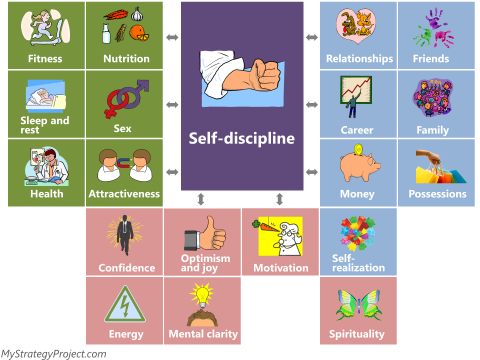Self-Discipline, Willpower and Responsibility
| ATTENTION! This module is part of your Personal Strategy Project. Studying it separately will give you no practical results. See project description and steps here. |
| Registered users will not see this message. Sign-in in the upper right corner. |
| Self-discipline affects your entire life |  |
 |
 |
Your entire life affects self-discipline |
Self-discipline and willpower is a fundamental factor of mood that gives you the opportunity to effectively reach the goals that you set in the other components of your Balanced System.
It gives you the opportunity to exercise properly, using the principles that we talked about in the corresponding module. In order to eat right in the world of imposed temptations, modern people also need self-discipline. Self-discipline is required to get proper rest and sleep, thus improving your health. Self-discipline is linked to motivation, which we'll talk about later. Naturally, your self-discipline has a very strong influence on all of the goals that you set for yourself.
It is necessary to achieve your goals in enhancing your attractiveness. Education and career also require significant self-discipline. And, of course, financial self-discipline is a very important element in achieving your financial goals. The goals that you set in your relationships and your communication with your friends and family often also require self-discipline. Cultivating self-discipline and being responsible is particularly important when you are around children, because they will learn from your behavior.
What parts of your Balanced System affect your self-discipline? As in other elements, hormones strongly influence your mood factors, including self-discipline. These hormones are produced by engaging in exercise, as well as getting good nutrition, sleep and rest. These elements affect your ability to control yourself, thus influencing your ability to behave in a disciplined manner.
There are several elements of positive feedback. Self-discipline helps exercise and nutrition. But your success in achieving goals and getting results (especially if establishing positive routines) as well as trained ability to control yourself and follow a regimen help your overall self-discipline in other areas in life.
An important element of self-discipline is, as we said, your motivation and related elements. Confidence that you are doing the right thing is another important aspect of self-discipline.
Another important contribution to self-discipline is mental clarity. You should know that you are doing only what is necessary.
One of the processes you are engaging here is re-engineering your life. And you need to know that you re-engineer everything that is necessary, but nothing more.
Perhaps you know this story. A man who is sawing wood is asked if it makes sense to sharpen his saw to cut the tree better. He says, "Leave me alone, I have no time; I have to cut the tree."
Usually, this story is given to prompt us to sharpen the saw (that is, to hone our skills and abilities).
You do indeed need to "sharpen the saw" and develop yourself when needed. But the first question to ask is, "Should I cut this tree?”. If you goals don't make sense, your self-discipline and efficiency would be useless.
Mental clarity gives you the opportunity to ask and answer such questions, clearly see your priorities and set goals that you'll reach using self-discipline.
| This module is not an article for casual reading, but a practical tool of your Personal Strategy Project. To continue working with the most important parts of this module (including access to restricted materials, interactive tools, tests, exercises, templates and applications), you need to Register. If you just want to browse, then this site is not for you. But if you want to get real results, then do Register and start working on your life. |
 |
